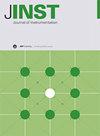Treating detector systematics via a likelihood free inference method
IF 1.3
4区 工程技术
Q3 INSTRUMENTS & INSTRUMENTATION
引用次数: 1
Abstract
Abstract Estimating the impact of systematic uncertainties in particle physics experiments is challenging, especially since the detector response is unknown analytically in most situations and needs to be estimated through Monte Carlo (MC) simulations. Typically, detector property variations are parameterized in ways that implicitly assume a specific physics model, which can introduce biases on quantities measured by an analysis. In this paper, we present a method to recover a model-independent, event-wise estimation of the detector response variation by applying a likelihood-free inference method to a set of MC simulations representing discrete detector realizations. The method provides a re-weighting scheme for every event, which can be used to apply the effects of detector property variations fully decoupled from the assumed physics model. Using a toy MC example inspired by fixed-baseline neutrino oscillation experiments, we demonstrate the performance of our method. We show that it fully decouples the modeling of the detector response from the physics parameters to be measured in a MC forward-folding analysis.用无似然推理方法处理探测器系统
估计粒子物理实验中系统不确定性的影响具有挑战性,特别是在大多数情况下探测器响应是未知的,需要通过蒙特卡罗(MC)模拟来估计。通常情况下,探测器属性变化以隐含地假设特定物理模型的方式参数化,这可能会对分析测量的数量引入偏差。在本文中,我们提出了一种方法,通过将无似然推理方法应用于一组代表离散检测器实现的MC模拟,来恢复检测器响应变化的独立于模型的事件估计。该方法为每个事件提供了一种重新加权方案,该方案可用于应用与假设物理模型完全解耦的探测器属性变化的影响。用一个受固定基线中微子振荡实验启发的玩具MC例子,我们证明了我们的方法的性能。我们表明,它完全解耦了探测器响应的建模与MC前向折叠分析中要测量的物理参数。
本文章由计算机程序翻译,如有差异,请以英文原文为准。
求助全文
约1分钟内获得全文
求助全文
来源期刊

Journal of Instrumentation
工程技术-仪器仪表
CiteScore
2.40
自引率
15.40%
发文量
827
审稿时长
7.5 months
期刊介绍:
Journal of Instrumentation (JINST) covers major areas related to concepts and instrumentation in detector physics, accelerator science and associated experimental methods and techniques, theory, modelling and simulations. The main subject areas include.
-Accelerators: concepts, modelling, simulations and sources-
Instrumentation and hardware for accelerators: particles, synchrotron radiation, neutrons-
Detector physics: concepts, processes, methods, modelling and simulations-
Detectors, apparatus and methods for particle, astroparticle, nuclear, atomic, and molecular physics-
Instrumentation and methods for plasma research-
Methods and apparatus for astronomy and astrophysics-
Detectors, methods and apparatus for biomedical applications, life sciences and material research-
Instrumentation and techniques for medical imaging, diagnostics and therapy-
Instrumentation and techniques for dosimetry, monitoring and radiation damage-
Detectors, instrumentation and methods for non-destructive tests (NDT)-
Detector readout concepts, electronics and data acquisition methods-
Algorithms, software and data reduction methods-
Materials and associated technologies, etc.-
Engineering and technical issues.
JINST also includes a section dedicated to technical reports and instrumentation theses.
 求助内容:
求助内容: 应助结果提醒方式:
应助结果提醒方式:


